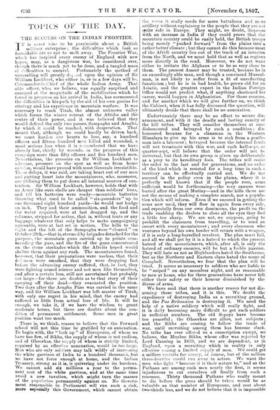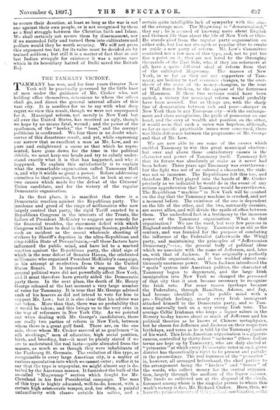TOPICS OF THE DAY.
THE SUCCESS ON THE INDIAN FRONTIER.
TT is never wise to be pessimistic about a British military enterprise ; the difficulties which look so formidable are so apt to melt away. The Frontier War, which has inspired every enemy of England with new hopes, may, as a dangerous war, be considered over, though there is much yet to be done, and a tangled mass of difficulties to unravel. Fortunately the method of unravelling will greatly dei.nd upon the opinion of Sir William Lockhart, who either is, or in a few days will be, Commander-in-Chief of the whole Indian Army. That able officer, who, we believe, was equally surprised and annoyed at the magnitude of the mobilisation which he found in progress on his arrival in India, has surmounted the difficulties in his path by the aid of his own genius for strategy and his experience in mountain warfare. It was necessary to reach Tirah, the almost unknown valley which forms the winter retreat of the Africhs and the centre of their power, and it was believed that they would defend the only two passes. Sampagha and Aragha, by which it could be reached, with desperation. That meant that, although we could hardly be driven back, we must harden our hearts to lose, say, a hundred officers and fifteen hundred men killed and wounded, a most serious loss when it is remembered that we have already lost, chiefly by wounds, in the progress of this cam paign more than fifty officers and five hundred men. Nevertheless, the pressure on Sir William Lockhart to advance, pressure on the spot as well as from home opinion, would have proved with most Generals irresistible. These delays, it was said, are taking heart out of our men and putting heart into the mountaineers, who, moreover, are utilising them to put down all internal sources of con- tention. Sir William Lockhart, however, holds that with an Army like ours shells are cheaper than soldiers' lives, and till his batteries were ready—mountain batteries throwing what used to be called "six-pounders" up to one thousand eight hundred yards—he would not budge an inch. They and, their ammunition, and the food and the water required, were at last dragged up, and the columns, stripped for action, that is, without tents or any baggage whatever that only helps to make campaigning agreeable, were at last set in motion. The hills to the right and the left of the Sampagha were " cleared " on October 29th,—that is, stormed by brigades detached for the purpose, the mountain guns carried up to points com- manding the pass, and the fire of the guns concentrated on the stone stockades which the Afridis hoped would shelter them against any rush. The mountaineers found, however, that their preparations were useless, that their def,nces were smashed, that they were dropping fast before the advancing enemy suffered, that, in fact, they were fighting armed science and not men like themselves, and after a certain loss, still not ascertained but probably not large—for there are doubts as to that story of their carrying off their dead—they evacuated the position. Two days after the Aragha Pass was carried in the same way, and Sir William Lockhart was left master of Tirah, with only one regret in his mind, that the enemy had suffered so little from actual loss of life. It will be enough, we take it, if we have the wisdom to grant moderate terms, but there are doubts about the con- dition of permanent settlement. Some men in great position want too much.
There is, we think, reason to believe that the Forward school will not this time be gratified by an annexation. To begin with, the "lock up" of Europeans, of whom we have too few, of Sikhs, the supply of whom is not endless, and of Ghoorkas, the so pply of whom is strictly limited, required by an effective annexation, would be too large. Men who are only soldiers may talk wildly of increasing the white garrison of India to a hundred thousand, but we have not force enough at home, and the Indian Treasury, strong as it is, is quivering under its burdens. We cannot add six millions a year to the perma- nent cost of the white garrison, and at the same time avoid a new taxation, which might turn the masses of the population permanently against us. No Govern- ment responsible to Parliament will run such a risk, more especially this Government, which cannot obtain the votes it really needs for more battalions and more artillery without explaining to the people that they are not quite safe in Europe. They might, no doubt, dispense with an increase in India if they could prove that the mountain country could be easily held, the British troops being merely "pushed forward" from the plains into a rather better climate ; but they cannot do this because most of the Afridi country lies out of the track of an invasion from the North, and we must hold that as well as regions more directly in the road. Moreover, we do not want either to irritate the Afghans or to be so very close to them. The present Ameer may be trusted, because he is an exceedingly able man, and though a convinced Mussul- man, is not likely to suffer from a fit of unreflecting fanaticism ; but he is in bad health, he grows old for an Asiatic, and the greatest expert in the Indian Foreign Office would not predict what, if anything shortened his career, would happen in Afghanistan. For these reasons, and for another which we will give further on, we think the Cabinet, when it has fully discussed the question, will ultimately decide that there shall be no annexation.
Unfortunately there may be an effort to secure dis- armament, and with it the deadly and lasting enmity of the hill tribes. They will consider themselves at once dishonoured and betrayed by such a condition ; dis- honoured because for a clansman in the Western Himalaya to give up his arms is to sink from a gentle- man into a labourer ; betrayed because the internal feuda will not terminate with this war, and each half-sept, or quarter-sept, will believe that the order will not be universal, but that its own group is given up deliberately as a prey to its hereditary foes. The tribes will resist, the order to the last and for generations, and no order of the kind which is resisted for a long time in such a territory can be effectually carried out. We do not succeed in the policy even in the plains, where it is perfectly well known that if the people rose, arms sufficient would be forthcoming—the very cannon were buried after the great Mutiny—and in the hills there are not the means of making a complete search, nor a popula- tion which will inform. Even if we succeed in getting the arms now used, they will flow in again from every side, and especially from our own dominions, the profit on the trade enabling the dealers to close all the eyes they find a little too sharp. We are not, we suppose, going to prohibit the clansmen from travelling, or to send an escort with every mountaineer ; and every clansman who ventures beyond his own border will return with a weapon, if it is only a long-barrelled revolver. The plan must fail, and all we shall get by it is a hatred to which the present hatred of the mountaineers, which, after all, is only the hatred of ordinary enemies, will be but a feeble passion. They will hate us not as Highlanders hated the Southrons, but as the Northern and Eastern clans hated the name of Campbell. Nevertheless, we fear that the plan will be tried. It seems so necessary to soldiers who are liable to be "sniped" on any moonless night, and so reasonable to men at home, who for three generations have never felt either their safety or their honour diminished by the disuse of arms.
We have said that there is another reason for not dis- arming these tribes, and it is this. We doubt the expediency of destroying India as a recruiting ground, and the Paz Britannica is destroying it. We need the help of a native soldiery which will really fight, and it is daily becoming more difficult to get such soldiers in sufficient numbers. The old Sepoys have become too peaceful ; the Ghoorkas are allies, not subjects ; and the Sikhs are ceasing to follow the trade of war, until recruiting among them has become slack. No tribe has ever offered us a conscription except, we believe, the Muzbee Sikhs, whose offer was rejected by Lord Canning in 1859, and we are dependent, as in England, upon a recruiting which in reality is only effective a mong a limited supply of men. We could get a million recruits for money, of course, but of the million three-fourths would run away in action. We want the men who fight "because it is their nature to," and as the Pathans are among such men nearly the first, it seems injudicious to cut ourselves off finally from such a resource. Thirty thousand Pathans who really meant to die before the guns should be taken would be as valuable as that number of Europeans, and cost about two-thirds less, and we do not believe that it is impossible
to secure their devotion, at least so long as the war is not one against their own people, or is not recognised by them as a final struggle between the Christian faith and Islam. We shall certainly not secure them by disarmament, nor if we succeeded fully and turned them into cultivators and pedlars would they be worth securing. We wiR not press this argument too far, for its value must be decided on by trained soldiers; but still it is a matter of fact that in our last Indian struggle for existence it was a native race which in its hereditary hatred of Delhi saved the British Raj.























































 Previous page
Previous page